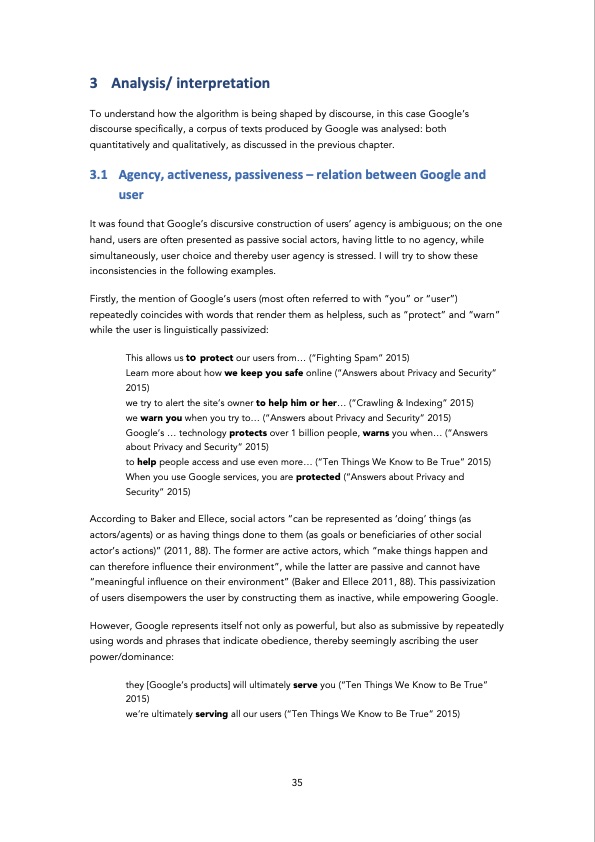
PDF Publication Title:
Text from PDF Page: 035
3 Analysis/ interpretation To understand how the algorithm is being shaped by discourse, in this case Google’s discourse specifically, a corpus of texts produced by Google was analysed: both quantitatively and qualitatively, as discussed in the previous chapter. 3.1 Agency, activeness, passiveness – relation between Google and user It was found that Google’s discursive construction of users’ agency is ambiguous; on the one hand, users are often presented as passive social actors, having little to no agency, while simultaneously, user choice and thereby user agency is stressed. I will try to show these inconsistencies in the following examples. Firstly, the mention of Google’s users (most often referred to with “you” or “user”) repeatedly coincides with words that render them as helpless, such as “protect” and “warn” while the user is linguistically passivized: This allows us to protect our users from... (“Fighting Spam” 2015) Learn more about how we keep you safe online (“Answers about Privacy and Security” 2015) we try to alert the site’s owner to help him or her... (“Crawling & Indexing” 2015) we warn you when you try to... (“Answers about Privacy and Security” 2015) Google’s ... technology protects over 1 billion people, warns you when... (“Answers about Privacy and Security” 2015) to help people access and use even more... (“Ten Things We Know to Be True” 2015) When you use Google services, you are protected (“Answers about Privacy and Security” 2015) According to Baker and Ellece, social actors “can be represented as ‘doing’ things (as actors/agents) or as having things done to them (as goals or beneficiaries of other social actor’s actions)” (2011, 88). The former are active actors, which “make things happen and can therefore influence their environment”, while the latter are passive and cannot have “meaningful influence on their environment” (Baker and Ellece 2011, 88). This passivization of users disempowers the user by constructing them as inactive, while empowering Google. However, Google represents itself not only as powerful, but also as submissive by repeatedly using words and phrases that indicate obedience, thereby seemingly ascribing the user power/dominance: they [Google’s products] will ultimately serve you (“Ten Things We Know to Be True” 2015) we’re ultimately serving all our users (“Ten Things We Know to Be True” 2015) 35PDF Image | peek into the discursive construction of the Google Search Algorithm: A critical discourse analysis

PDF Search Title:
peek into the discursive construction of the Google Search Algorithm: A critical discourse analysisOriginal File Name Searched:
thesis-google-search-algotithm.pdfDIY PDF Search: Google It | Yahoo | Bing
Cruise Ship Reviews | Luxury Resort | Jet | Yacht | and Travel Tech More Info
Cruising Review Topics and Articles More Info
Software based on Filemaker for the travel industry More Info
The Burgenstock Resort: Reviews on CruisingReview website... More Info
Resort Reviews: World Class resorts... More Info
The Riffelalp Resort: Reviews on CruisingReview website... More Info
| CONTACT TEL: 608-238-6001 Email: greg@cruisingreview.com | RSS | AMP |